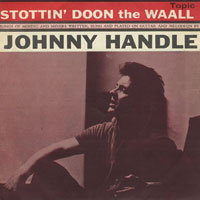

Sleeve Notes
JOHNNY HANDLE is the pseudonym of a young man from Newcastle upon Tyne (actually he was born in Wallsend), who has made a name for himself as one of the best writers of modern songs in traditional style in the country. But his songs are of a very particular tradition; that of the bards of industrial Tyneside and the surrounding coalfield of Northumberland and Durham. His songs are about, and very much in the idiom, of the people amongst whom he was born and with whom he has lived and worked all his life. Mostly they concern 'pit people'. Handle has worked in coal mining for eleven years.
He was born in 1935. His father is a schoolmaster. The only connections with mining in the family are on his mother's side; his grandfather and uncle both worked in the pits. He was educated at Heaton Grammar School, Newcastle, but at the age of seventeen, after rejecting an academic career, went into the pits, starting as a surface timber hand before being trained and sent underground. At school he had been nicknamed 'Panhandle', because of his interest in prospecting and geology, an interest which led him into coal-mining. After leaving school this was shortened to 'Handle' as, so Johnny says, recognition of his changed status. His true name has remained with him in the National Coal Board in which he eventually became a mining surveyor. But to people outside the pits he is still known as Johnny Handle.
His musical 'career' started in the jazz clubs of Newcastle. There he played a variety of instruments, mainly piano and guitar (strung to banjo tuning). When not playing in bands he sang blues and American folksongs. Early in 1958 he met and started singing with other folksingers and in the latter part of that year helped to found the Newcastle Folksong and Ballad Club. Gradually his interest changed from American material to British, with an especial interest in local songs. One book had a profound effect on Handle; it was A. L. Lloyd's "Come all ye bold miners". Johnny often refers to it as 'the Bible'. This book is a compilation of mining songs, the majority of which come from the North-east. It was reading and singing the songs in this book that started Johnny writing his own songs about the pits.
Johnny Handle is an unusual person. He is a 'townie' who, without having any immediate background of mining and miners, has gone into an industry in which the workers live a life of their own, both in and out of the mines. He has soaked himself, not only in the work and the history of the pits, but also in the life of 'pit folk'. He is an 'outsider' who has become an 'insider'. His songs, a reflection of pit work and life, vie with the best songs of Thomas Armstrong, Durham's great pit bard.
This record contains six of the best of Handle's songs. They are all highly localised songs, written and sung in the dialect and accent of Tyneside. But these are songs very much of the people, and it is only by listening to people talking and singing in the speech with which they are most familiar that one learns anything of their true feelings. Handle does not write his songs for people, certainly not for those outside Northumberland and Durham. His songs are about people, and a way of life that he loves; and those people and that way of life are of the North-east of England. By listening to his songs you, the listener, will learn something about the way 'Geordies' truly live and think.
Johnny Handle is a young man. He has many years of songwriting ahead of him. If the standard of his songs remain as high as those on this record, he will surely be ranked with other great North-east writers, Armstrong, Wilson, and Ridley.
LOUIS KILLEN